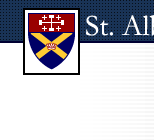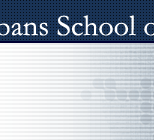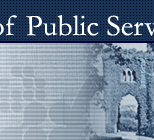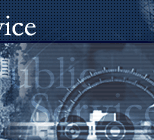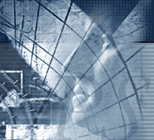|
As a soon-to-be senior, I thought twice before deciding
to take four more weeks of school: extra work in the summer,
heeding dull politicians, a huge time commitment? Besides,
this was the first year, the experiment. How good would it
be? However, after mulling it over, I concluded that The St.
Albans School of Public Service was going to provide me with
opportunities that I simply should not pass up. And, looking
back, I am very glad that I did enroll. Living in the St.
Albans dorms, waking up early to read the Post over breakfast
and to attend class, driving around my favorite city to go
inside where I had never been, hanging around with an enthusiastic
group of kids from around the country was a truly enlightening
experience. It was a blast.
The program centered around classes in the morning and afternoon.
At each gathering in the Kellogg Room, a salon on the first
floor of the activities building, either one of the SPS faculty
or a guest speaker would introduce himself, work with the
students on a particular
aspect of government, politics, or public policy, and open
the floor for discussion and questions. Each week's studies
fit under a different topic: each of the branches of government,
the media, and America's relation to the world.
In this college-like atmosphere, students contemplated "case
studies" under the guidance of a faculty member. One
could often rely on these discussions to be filled with heated
debate, sometimes concluding with a complete split of opinion.
The class always felt fulfilled, however,
having stretched their minds to find solutions for a difficult
situation. One case in particular gave the class trouble:
the "Eugene Hewelstein" Case, written by one of our teachers
Mrs. Grazette, The American Aeronautics & Aviation Museum
had hired a new director with a mission
to add personal effects to the exhibits. Once hired, he wanted
to display the Enola Gay, the airplane
that carried the Atomic bomb used to end the war in the Pacific.
He also wanted to show the aftermath of destruction and of
suffering at Hiroshima immediately thereafter. At the end
of the exhibit, the new director placed a line of his own
writing in a prominent position, expressing his
opinion that the bomb may have been necessary, yet it was
exceedingly horrible. In sum, the veterans became angry, provoking
their representatives in Congress to take action against the
exhibit. The director was ultimately forced to resign. The
class read cases such as this in an effort to consider rules
of conduct and to note possible motivation. Finally, the teacher
encouraged each student to decide whether or not the main
players had taken the right action. The case studies, in essence,
exposed the class to "real world" issues; they demonstrated
how powerful figures or organizations can influence an outcome
greatly. And if the students did not agree with it, perhaps
they could eventually work to change or to improve policy.
Guest speakers from government and from the private sector,
possessing special knowledge regarding public service, often
addressed the group. The SPS faculty carefully selected these
speakers based on the topic of the week. Speaker bios were
posted on our web site (the "Black Board") with
helpful links containing optional readings, plus our assignments
and announcements. Students had access to the Internet at
all times from their laptops, supplied at the start of school.
Many speakers provided the class with insights on government
departments and subgroups: State, Defense, Treasury, Justice,
NSC, FBI, CIA, foreign service. Others explained their roles
in serving the public: Kathleen Matthews from Channel 7 News,
Bo Jones from the Washington Post, Ray Suarez and Sharon Rockefeller
from the News Hour and PBS, and Bill Strauss from Capitol
Steps, to name a handful. Each took time to answer questions
and seemed genuinely enthusiastic about the School of Public
Service program. One speech writer, Lowell Weiss, had worked
for
Presidents Reagan, Bush, and Clinton, and on the Al Gore campaign.
About ten writers would draft an address. A president would
often edit the paper to make it his own. President Clinton
was an exuberant editor. For one of his speeches, President
Reagan did not follow his script and made it up on the spot.
President Bush, on one occasion, had not been given the correct
speech; since he knew the material, he could make up a speech.
Weiss described in detail Gore's democratic convention. Right
before Gore was to approach the lectern, he found a part of
the composition he disliked. The alarmed writer quickly amended
it. The section corrected, he remembers fretting and sweating
as Gore delivered his speech. He
recalled that his was not an easy job. Two hundred different
speeches had to be created in one campaign. Thus, while writing
speeches became more and more routine, he still felt a great
deal of pressure. On top of that, a speech writer and an orator
rarely maintain a friendly relationship, at least in his experience.
The writer delights in his job, in spite of an absence of
amity, expressly at those times when he can insert a little
of his own "poetry." Suggesting essays and newspaper
writing as a good preparation, Weiss recommended the writer's
profession to anyone who
enjoys writing. Dr. Rob Shurmer, another one of the illustrious
SPS faculty and a history teacher at STA, expressed his nostalgia
for the venerable skills of personal rhetoric evidenced in
bygone elections. Yet, as Dr. Shurmer assented with a smile,
such rhetoric of the past has yielded to present "needs"
and to mass media. Such guest appearances were memorable.
And often spellbinding.
Over the extent of the program, students had the opportunity
to visit government buildings, monuments, and other sites
related to public service in and around Washington. Additionally,
many of the representatives from government that the class
visited had ties to St. Albans School, such as John Bellinger
at the White House, David Aufhauser at the Treasury Building,
Senator Bill Frist who gave the class a private tour of the
Senate, and Congressman Harold Ford Jr. SPS dropped by a fair
number of media locales: ABC News, Washington Post, News Hour,
Hardball,
and Meet the Press. Everywhere, they treated the school very
well. Tim Russert answered questions before the show. He left
quickly at the end to go fishing with Luke, but the aides
invited SPS to explore the set. Chris Matthews, on the other
hand, gave and signed copies of his new book for each student
in his office, just days before his malaria.
Between classes and reading assignments, guest speakers and
trips around the city, SPS structured activities did not leave
overly much time free for social events or for simple wandering.
Although we did have afternoons off for a couple hours of
peripatetic independence, such as going out to dinner, shopping
in Georgetown, or catching a movie. SPS also arranged college
visits to UVA, the Naval Academy at Annapolis, Georgetown,
Howard, and Johns Hopkins, plus providing some good connections.
One girl, after hearing from a former foreign service
officer, announced that she had found her calling and desired
to enter the School of Foreign Service at Georgetown. Steve
Su, a superb tour guide and a graduate of UVA, enjoyed our
company so much that he came back to take us out to dinner
and dancing.
One night, toward the end of school, SPS treated its students
to an enchanting dinner in honor of Madame Secretary Albright,
with many of those who had helped push the School of Public
Service into reality. This banquet was thoroughly marvelous
and an article appeared in The
Washington Post the next day. On one of the last nights, SPS
held mock elections. Dr. Shurmer had masterminded and run
the Election Game which had been ongoing for the entire length
of the program. The mechanics of the game were mysterious
and known only to "the good doctor." Nevertheless,
candidates were supposed to gain support by traveling and
campaigning over an imaginary USA. Think Fantasy Football
becomes Fantasy Presidential Election. A
candidate could e-mail their actions, speeches, and whereabouts
around the country to the Election Game staff, Dr. Shurmer
and Mr. David Zimand. Moreover, he or she could give a speech
at mealtime, post advertisements around the school or on the
Internet, and even make a guest appearance on Mr. Norman Constantine's
political show Norm at Night. The polls for each
state, together with a report of each aspiring president's
treasure chest, were posted on Black Board. Each contestant
chose a dossier beforehand of a certain political figure.
After editing it to his liking, he used this background to
launch a campaign, stressing issues important to "the
American people." Considering the short period for this
election, clever candidates utilized a highly important mode
of "strategery" in amassing a substantial campaign
staff. At election night in the Refectory, following weeks
of extra hours, hard campaigning, scandals, and primaries,
the rest of the students broke up into caucuses to vote on
the five key swing states. Coincidentally, the vote was amazingly
similar to the actual Presidential Election of 2000. It was
extremely close and could have gone either way. Many thought
Senator H. had won, even though it seemed that Senator B.
had achieved the majority of electoral votes. However, there
was no recount or re-vote since Dr. (dictator) Shurmer was
in control of the operation. Then we danced to 'N Sync in
(don't tell Mrs. Ching) the Lower School Library.
The next day a proposed budget had to be presented to the
President-elect. Bob Knisely, a faculty member who had spent
a lifetime in public service and carried a seemingly endless
store of advice for the students, supported his addition to
the game by saying, "if the Presidential Game ended with
the election, it would be a Cinderella ending." So, he
setup the Presidential Endgame. A panel of advisors sat beside
the President in the Kellogg Room as spokesmen addressed them
and posed their request for a certain amount of money. An
advocate for these
budget requests had to present a compelling case to the President,
a justification for allocating funds that would go toward
the death penalty, AIDS, rebuilding Afghanistan, the War on
Terrorism, and the Treasury. After questioning the presenters
and meeting with his panelists
in the Trophy Room, President B. announced his budget and
issue priorities. One highlight: he amended part of last year's
tax cut.
As students departed to the airport and waited for their
parents to pick them up at Senior Circle the next morning,
everyone hugged, kissed, cried, and promised to keep in touch.
We had accomplished a lot together. We had spent a huge part
of our summer working hard, pursuing our interest. Because
of this common curiosity about public service and because
of the great selection of kids on the part of SPS, many had
bonded and made long lasting friendships. Indeed, they had
found that cooperation and skills of compromise were essential
qualities for any
successful public servant. From the ropes course to the gaming
room recommendations for a crisis in Zimbabwe at the War College,
students learned that working together was the key to success.
I can well appreciate St. Albans as a source of blossoming
community. It holds this
virtue at its core.
We shared the same tremendous experience of an introduction
to government, the media, and public policy. Now, although
hopefully planning to keep in touch, we set off on our separate
paths. SPS had acquainted us with knowledge and advantageous
skills toward a promising
future. For some, it had confirmed a career choice. For others,
it had sparked an interest. Regardless, it certainly had helped
to prepare us for next year, for college, and for life. |
